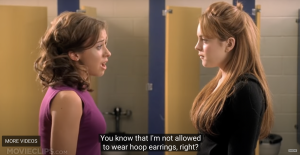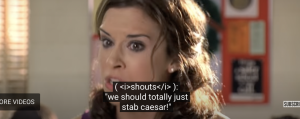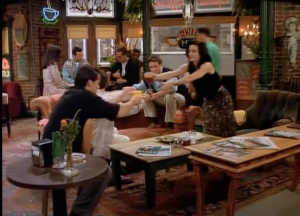




The pictures above represent a short scene from the film Mean Girls, where one of the characters, Gretchen Weiners, vents to the main character, Cady Heron, about the extent of emotional work that she performs for their rude friend Regina George. In this specific scene Gretchen describes that Regina told her she was not allowed to wear hoop earrings; so when Gretchen got a pair of “really expensive white-gold hoops,” she had to pretend to not like them to appease Regina’s instructions. This is a perfect example of emotion management and the feeling rules associated with the idea of gift exchange. For the emotion management aspect, Gretchen manages her emotions and pretends to dislike her earrings in order to not upset Regina; she is managing both her own and Regina’s emotions. She is changing her bodily actions and expressions by not wearing something she wants to wear to prevent Regina from being angry. By doing this, she is adhering to the feeling rules that are established by Regina as in Regina’s eyes Gretchen’s dislike for her earrings is expected. However, for her parents, she is going outside the feeling rules of the gift exchange as she is not showing gratitude and appreciation of their gift, something we expect in return after giving a gift like earings. This example of managing emotions when someone receives a gift is counterintuitive as typically one pretends to like a gift when they actually do not, instead of the other way around. This shows the adaptability of emotional management as the context of each situation determines the ways in which emotional management can be expressed.











In this scene, Gretchen expresses her feelings of unhappiness through a clandestine attack by discussing how poorly Caesar treats people; in this story, she refers to Regina when she talks about Caesar and herself when she refers to Brutus. By comparing Regina to Caesar she implicitly expresses her frustration with how Regina treats her. However, to protect Regina from becoming upset and embarrassed, she does not confront her explicitly. In this case she is able to express her anger with Regina while simultaneously protecting Regina’s emotions by tailoring her speech to implicitly call out Regina; she gets to express her frustration without angering or embarrassing Regina. She manages her emotions as well as Regina’s in this scene; she also conducts her actions within social norms as it would be considered rude to yell at Regina explicitly.
In both of these scenes from Mean Girls, the reason she manages her emotions is driven by the social norm of fitting in. She wants to be a part of the desired and popular “plastics” (the social group in which Regina George runs) and in order to maintain this status as a plastic she has to keep herself on Regina’s goodside. Thus, her seeked out approval of Regina forces Gretchen to manage her emotions throughout the movie; her emotional management results in her portraying herself in a certain way that allows her to fit into this social group and therefore the social world in general.


The scene above is from the popular TV Series Friends, in which one of the main characters, Rachel, is a waitress at the local coffee shop their group of friends frequent. She delivers them their orders of coffee and she seemingly gets it right. As she thinks she correctly delivered everyone’s coffee to the right person, she becomes happy that she did it right, believing that she has finally become a good waitress; however, when she leaves the group of friends, they all instinctively switch around their coffee revealing all of Rachel’s mistakes. Their decision to wait to return the coffees to the right people so Rachel did not see was to protect her emotions and prevent her from being upset. Customers manage their emotions when they do not tell waitresses or other service workers that their order is messed up in order to protect the emotions of the workers. This representation of people in society shows the nature of emotional management to protect individuals emotions, especially when it comes to service work.